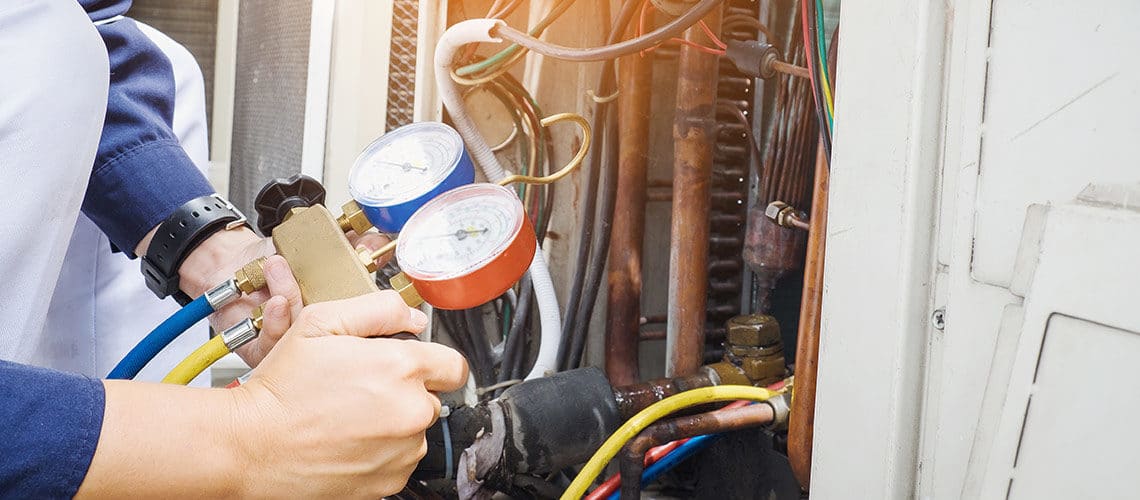Energy-Efficient Cooling And Heating Equipments to Save on Utility Bills
As power expenses continue to increase, the importance of energy-efficient heating and cooling systems becomes progressively evident. These systems not only guarantee substantial cost savings on energy bills however also add to an extra sustainable future by minimizing power intake. With different options readily available, consisting of geothermal heatpump and ductless mini-splits, residential property owners deal with a wide range of choices that can improve comfort and air quality. Nevertheless, recognizing the crucial functions and maintenance requirements is vital to optimizing these advantages. What variables should be focused on when selecting the ideal system for your requirements?
Benefits of Energy-Efficient Cooling And Heating Equipments
Energy-efficient heating and cooling systems provide countless advantages that extend past plain price financial savings. One substantial advantage is the lowered ecological impact. By consuming much less energy, these systems add to lower greenhouse gas discharges, assisting to battle climate change and advertise sustainability. This lines up with raising societal demands for eco-friendly techniques in household and industrial setups.
Additionally, energy-efficient cooling and heating systems commonly provide enhanced convenience degrees. Most of these systems include advanced innovation that allows for far better temperature control and enhanced air top quality (DMAKS HVAC). This leads to a healthier interior environment, which is particularly vital for people with allergic reactions or respiratory issues
Additionally, buying energy-efficient HVAC systems can enhance residential or commercial property worth. As more customers prioritize energy efficiency, homes and buildings furnished with these systems may bring in greater bids in the realty market.
Sorts Of Energy-Efficient Cooling And Heating Options
Just how can homeowners and companies select one of the most suitable energy-efficient cooling and heating options for their requirements? The marketplace supplies a variety of energy-efficient a/c systems, each made to boost convenience while minimizing power intake.
One option is the variable cooling agent circulation (VRF) system, which successfully controls the temperature in multiple areas within a structure. This system adjusts its refrigerant flow to match the desired temperature, leading to substantial power cost savings.
One more preferred choice is geothermal heatpump, which use the planet's stable temperature level to heat and great rooms. By transferring warmth to and from the ground, these systems demonstrate impressive efficiency, especially in modest climates.
In addition, ductless mini-split systems offer an energy-efficient alternative for homes lacking ductwork. These systems permit for zone-specific heating & cooling, decreasing power waste in empty locations.
Finally, high-efficiency heaters and air conditioning unit, with innovative SEER and AFUE scores, supply trusted climate control while taking in less energy than typical versions. By evaluating these alternatives, house owners and services can pick a cooling and heating system customized to their details demands and power effectiveness objectives.
Key Functions to Take Into Consideration

Next, examine the sort of compressor used in the system. DMAKS HVAC. Variable-speed compressors can change their output to match the home heating or cooling down demand, leading to enhanced convenience and energy financial savings contrasted to single-speed models. In addition, search for systems geared up with smart thermostats that provide programmable setups and remote accessibility, allowing for far better control over power consumption
One more essential feature is the system's air filtration capacity. High-efficiency filters can improve interior air high quality and decrease energy usage by ensuring the system operates efficiently. In addition, consider the kind of refrigerant used; modern-day systems usually use environment-friendly cooling agents that have a reduced environmental influence.
Last but not least, guarantee that the system works with zoning technology, which enables for personalized temperature control in different areas of your home, enhancing convenience while reducing energy usage.
Tips for Selecting the Right System


Next, think about power effectiveness rankings, especially the Seasonal Power Efficiency Ratio (SEER) for cooling systems and the Yearly Fuel Use Performance (AFUE) for heating unit. Higher rankings indicate better performance, which can cause substantial cost savings on utility bills gradually.
Furthermore, review the kind of a/c system that ideal matches your way of living and spending plan. Alternatives include central air, ductless mini-splits, and heat pumps, each with its own collection of benefits and drawbacks.
Don't overlook the significance of appropriate installment and sizing; an inaccurately sized system can bring about ineffectiveness and raised wear. Finally, talk to a professional cooling and heating professional to get experienced recommendations tailored to your home's unique demands. This detailed technique will ensure that you select an energy-efficient cooling and heating system that satisfies your needs and budget plan effectively.
Upkeep for Optimum Efficiency
Once the right a/c system is in place, continuous upkeep ends up being crucial to making certain optimal effectiveness and longevity. A properly maintained system runs much more efficiently, causing reduced power intake and minimized energy costs. Regular inspections and tune-ups useful content ought to be scheduled a minimum of twice a year-- once prior to the air conditioning season and as soon as before the heating period.

Home owners must likewise be cautious concerning monitoring their a/c system's performance. Unusual sounds, fluctuating temperatures, or increased power bills can suggest underlying concerns that need prompt focus. By resolving these issues without delay, home owners can protect against costly repair services and expand the life-span of their systems.
Spending in an upkeep strategy with a certified technician not only enhances effectiveness but additionally offers peace of mind, knowing that the system is operating at its best. DMAKS HVAC. Routine upkeep is for that reason essential for sustaining energy effectiveness and lowering total functional costs
Verdict
To conclude, energy-efficient a/c systems offer a practical solution for reducing utility bills while enhancing comfort and air quality. By incorporating sophisticated technologies and alternatives such as geothermal warmth pumps and ductless mini-splits, homeowner can achieve significant energy savings and add to ecological sustainability. Cautious factor to consider of system functions and continuous maintenance additionally ensures ideal efficiency, making energy-efficient systems a prudent financial investment for both financial and eco-friendly advantages.